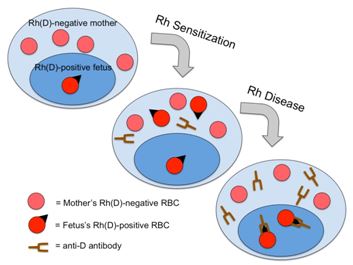RhD
 Rh blood group D antigen (RhD), also known as Rh4 or RhII, encoded by RHD gene, is the most important blood group antigen which exist on the red blood cell surface, belonging to the Rh blood group system. The RhD exerts the most strong immunogenicity, second to A or B antigen. According to the presence or absence of the highly immunogenic RhD protein on the surface of erythrocytes, individuals are divided into Rh-positive and Rh-negative.
Rh blood group D antigen (RhD), also known as Rh4 or RhII, encoded by RHD gene, is the most important blood group antigen which exist on the red blood cell surface, belonging to the Rh blood group system. The RhD exerts the most strong immunogenicity, second to A or B antigen. According to the presence or absence of the highly immunogenic RhD protein on the surface of erythrocytes, individuals are divided into Rh-positive and Rh-negative.
The RhD is specifically expressed in bone marrow and skin. It is proved that RhD plays an essential role in clinical blood transfusion and the pathological processes of some diseases including neonatal hemolysis disease, delayed hemolytic transfusion reaction, autoimmune hemolytic disease. An RhD-negative people who do not produce RhD antigen in one's bloodstream will produce anti-D antibodies when exposed to RhD-positive blood, leading a hemolytic disease. Similarly,the RhD-positive exposure happens during pregnancy when an RhD-positive fetus can transport into RhD-negative mother. And the RhD-negative mother will produce anti-D antibodies which can cross the placenta arrived into the red blood cells of an RhD-positive fetus, thus resulting in hemolytic anemia, and even fetal death.
Gene ID: 6007
UniProt ID: Q02161
If you can’t find your product on this list? Please directly send email to .
For Research Use Only. NOT FOR CLINICAL USE.
Online Inquiry
Welcome! For price inquiries, please feel free to contact us through the form on the left side. We will get back to you as soon as possible.
